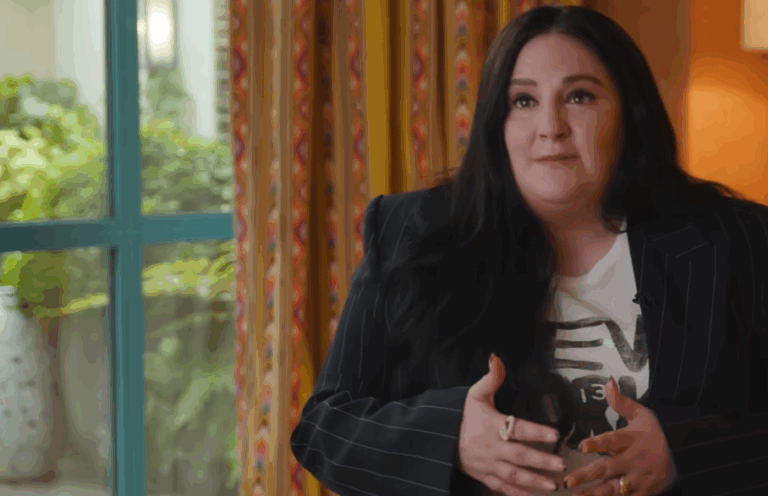Lena Dunham has recently found herself at the center of a discussion that she never really agreed to. The term “fat” associated with her body has long been considered public property. The criticism has not only persisted, but has increased since her early roles in Girls, in which she was unabashedly exposed, vulnerable, and naked on screen, to her most recent role in Too Much. Dunham herself, however, has changed dramatically—refining her voice, rephrasing the story, and refusing to be categorized by dress size—while the commotion has remained obsessed.
Strangers have examined her body with surgical precision. She was commended for weighing 138 pounds; however, the tone changed when she gained a few pounds. She leaned in anyway. She once wrote, “As I type, I can feel my back fat rolling up under my shoulder blades.” That degree of openness—funny, truthful, and unapologetically honest—felt both revolutionary and recognizable. She wasn’t requesting cheers. With extraordinary clarity, she was pointing out the ridiculousness of judgment.
She destroyed an illusion that so many celebrities strive so hard to maintain by openly embracing the changes in her weight and health. Her readiness to talk about early menopause, chronic pain, and the aftermath of a hysterectomy at age 31 didn’t just make her more relatable. It revealed an audience and industry that were extremely uneasy with naturally evolving bodies. Her experiences were honest, relatable, and significantly enhanced the conversation about women’s health; they were neither filtered nor romanticized.
Lena Dunham Profile Table
| Attribute | Detail |
|---|---|
| Full Name | Lena Dunham |
| Date of Birth | May 13, 1986 |
| Nationality | American |
| Occupation | Actress, writer, producer, director |
| Known For | Girls (HBO series), Tiny Furniture, Too Much (Netflix) |
| Body Image Notability | Frequently discussed body standards, public nudity, self-expression |
| Health Conditions | Endometriosis, hysterectomy at 31, early menopause |
| Public Response | Vocal critic of fatphobia, body shaming, media obsession |
| Advocacy Focus | Women’s health, inclusivity, authenticity |
| Reference Link | www.vulture.com/article/lena-dunham-too-much-end-of-the-funny-fat-lady.html |

For individuals who were raised surrounded by the refined aesthetics of television in the early 2000s, Dunham’s appearance on screen was startling at first, but ultimately freeing. Her storylines were not dictated by her weight. There were no jokes in her sex scenes. It wasn’t ironic that she was nude. It was contemplative. And that unvarnished authenticity was remarkably similar to a form of resistance at a time when the ideals of the “Instagram body” were solidifying. She wasn’t trying to be thin, and she wasn’t thin.
“I have been in Hollywood at every size… and it is merciless wherever you are,” she said while promoting Too Much. That straightforward but incredibly illuminating sentence draws attention to a particularly damaging reality. Criticism isn’t limited to larger bodies. As long as it doesn’t fit precisely, it’s every body. Even when it does, the criticism simply changes its focus. The glamorized body overhaul trend was effectively countered by Dunham’s refusal to pursue the elusive perfection.
She has freely admitted that being chosen as a romantic lead, whether or not she is overweight, goes against long-held beliefs in the industry. Her appeal isn’t dependent on change, in contrast to other popular female leads. It just is. Relationships between her characters are real, occasionally tumultuous, and frequently loving; they are not fantasy. This representation is especially helpful to many viewers, especially women who have never seen an honest reflection of themselves.
She has faced mockery from peers in the industry as well as from media outlets during the last ten years. She was once called “a little fat girl” by Howard Stern, a comment that provoked both indignation and introspection. It appeared to be one more hit in a string of blows at the time. However, in retrospect, that moment has not held up well. Dunham’s measured, unrepentant, and considerate response assisted in refocusing the discussion. Her weight was never the problem. It was about a woman who refused to play along making other people uncomfortable.
Her candor regarding her hysterectomy and menopause shows how medical reality is frequently left out of body narratives. She stated that she could “feel something was wrong with [her] uterus,” to use her own words. She was also correct. She still has concerns about motherhood after surgery. She told Variety, “I want to have children, but I don’t want them to grow up in the shadow of whatever this is.” Her remarks were deeply deliberate rather than resentful.
Her decision to openly discuss health setbacks has encouraged others to reconsider silence as a means of survival. She said, “Being aware that [my challenges] don’t define me has made me more grounded, more present.” Her public position on fatphobia, friendships, and professional endeavors have all demonstrated this groundedness. She does not object to being called “fat.” She simply won’t allow it to be used as a derogatory term.
Lena’s method is especially novel because it disentangles value from outward appearance. She has stated, “We cannot pretend that the bodies people want aren’t influenced,” emphasizing that commercial distortion affects even body positivity. Once again, the introduction of weight-loss medications like Ozempic and Mounjaro has altered the discourse. However, Lena continues to prioritize self-awareness over band-aid solutions.
This clarity has struck a chord with many people. Reddit threads now discuss how, in 2012, viewers were shocked by her body and thought a size-12 woman was “laughably fat.” However, younger viewers—particularly teenagers—are perplexed by the outcry. That discrepancy points to something noteworthy: advancement. Not perfection, but a change in perspective that would not have been achievable if it hadn’t been addressed directly by individuals like Lena Dunham.
Lena’s reflections became a source of solace during the pandemic, when many people reassessed their relationship with body image and self-worth. She made fun of her “pod belly” while revealing more profound realities about resiliency. She created a bridge between suffering and permission—the kind that lets people exist without justification—by strategically being transparent.
Her detractors are still around. But they no longer have as much power. Lena Dunham now stands for a type of visibility that defies erasure. She is not here to offer an apology for being “fat,” “frail,” or any other derogatory term that people use to describe women’s bodies. Her purpose is to work, create, parent, heal, and be seen in its entirety.


